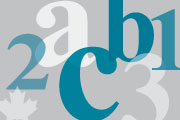Becoming a CLBPT assessor
CCLB does not train individuals on the placement tests; it only provides training to approved assessor candidates for licensed sites (individual(s) must be employed at the assessment centre) as it is a placement tool used by licensed assessment providers for publicly funded organizations. In order to be trained as a CLBPT assessor, CCLB must receive a request from a licensed assessment site for you to complete the training. The assessment centre contact person should always be the designated administrator/coordinator.
Sessions are scheduled on demand. If a licensed assessment site requests training for an assessor candidate, the assessment site administrator/coordinator must submit the candidate’s full resume to CCLB for approval before we work together in scheduling the training. Training is a 1-day virtual meeting with the trainer followed by a 3 month certification period that requires the candidate to conduct at least 10 real assessments of clients from your assessment site and submit 3 to the trainer for certification (certification samples must vary in CLB levels).
For staff to become qualified assessors they need to have proficiency in English (minimum CLB 9 equivalent) and the following:
- Employed (or will be employed by the training date) at the licensed assessment centre making the training request
- A recognized University degree in English, linguistics/languages or similar field
- TESL training recognized by TESL Canada or Provincial teaching credentials
- Taught at least 300 hours of ESL to adults (within the last 2 years in Canada)
- Knowledge of CLB demonstrated through use of and/or participation in CLB workshops
Having prior CLB training and using the CLB’s in a LINC or ESL classroom in Canada is a key component of the experience we look for in assessors. Without this experience, the candidates have high difficulty navigating the different benchmarks and are not able to accurately assess their clients.
Additionally, in the current circumstances, these digital aspects must also be met by the assessor candidates:
- Possess appropriate digital tools at the office or at home depending on the work accommodations (computer, headset, webcam, stable internet connection, quiet workspace)
- Possess a Zoom account (free account is all that is required)
- Be very familiar with Zoom options (including but not limited to: scheduling meetings, sharing a screen, copy-pasting into chat, managing participants, recording the meeting)
- Be resourceful when problems occur on a website (i.e.: logging in to the website doesn’t work = make sure you type in the correct information, make sure there are no spaces after or before the information, make sure there are no spelling mistakes; or the information is not loading as per usual = did you try a different web browser?, how is your internet connection?, did you try rebooting your computer?; etc)
- Have experience with online self-directed courses (such as courses on learning.language.ca)
CLBPT training process:
- Complete the online courses: CLB Bootcamp and An Orientation to ESL for ALL (free courses)
- Attend the 1-day virtual meeting with the trainer
- Complete real assessments and submit forms and audio recordings to the instructor for certification at the latest 3 months after the virtual meetings with the trainer (complete at least 10 assessments and submit at least 3 samples of varied levels); the trainer will provide feedback
- If the assessor candidate’s certification samples are satisfactory, certification will be confirmed; if the samples are not satisfactory, the trainer will request additional samples following constructive feedback
CLBPT assessor training fees:
- Training: $1,500.00 for up to 6 candidates or $250 per candidate if more than 6 per session (cost is pro-rated to the number of candidates being trained IF they are from different assessment sites)
- Proctor-less CLBPT Remote account: $100 per candidate
- Certification: $350.00 per candidate
- Admin fees: $250.00 (cost is pro-rated if there is more than one assessment site participating in the training)










